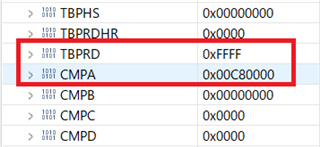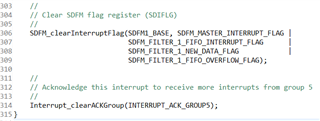Other Parts Discussed in Thread: C2000WARE, LAUNCHXL-F280049C, AMC1306EVM
主题中讨论的其他器件:C2000WARE、 LAUNCHXL-F280049C、 AMC1306EVM
你(们)好
我已将 \\ti\c2000Ware_3_02_00_00\driverlib\f28004x\examples\sdfm 下的 sdfm_ex5_filter_sync_fifo_cpuread.c 更改为将 PWM8用于同步信号、将 PWM1用于 SDFM 时钟。
本计划有以下一些问题:
当我使用 SDFM_enableWaitForSync (第212行)让 SDFM 等待 PWM SOCA 信号时、程序无法进入 sdfmFIFO1ISR。
2.当我不使用 SDFM_enableWaitForSync 时、程序会进入 sdfmFIFO1ISR、但进入的时间不合理:
我设置不同的 FIFO_INT_NUM 值、如果 FIFO_INT_NUM 增大、我假设转换时间(PWM8.TBCTR)应更大、
但我不遵循此规则的时间、请参阅以下数据(PWM1提供10MHz 时钟):
FIFO_INT_NUM 第2次运行
3. 6815. 7075
4. 6753 6593
5. 6793 6665
9. 6675 6493
此处列出的代码供您查看:
//########################################################################### // // FILE: sdfm_ex5_filter_sync_fifo_cpuread.c // // TITLE: SDFM Type 1 Filter FIFO Example. // //! \addtogroup driver_example_list //! <h1> SDFM Type 1 Filter FIFO </h1> //! //! This example configures SDFM1 filter to demonstrate data read through //! CPU in FIFO & non-FIFO mode. Data filter is configured in mode 0 //! to select SINC3 filter with OSR of 256. Filter output is configured //! for 16-bit format and data shift of 10 is used. //! //! This example demonstrates the FIFO usage if enabled. FIFO length is set //! at 16 and data ready interrupt is configured to be triggered when FIFO is //! full. In this example, SDFM filter data is read by CPU in SDFM Data Ready //! ISR routine. //! //! \b External \b Connections \n //! Connect Sigma-Delta streams to (SD-D1, SD-C1 to SD-D4,SD-C4) //! on GPIO24-GPIO31 //! //! \b Watch \b Variables \n //! - \b filter1Result - Output of filter 1 //! // //########################################################################### // $TI Release: F28004x Support Library v1.09.00.00 $ // $Release Date: Thu Mar 19 07:26:52 IST 2020 $ // $Copyright: // Copyright (C) 2020 Texas Instruments Incorporated - http://www.ti.com/ // // Redistribution and use in source and binary forms, with or without // modification, are permitted provided that the following conditions // are met: // // Redistributions of source code must retain the above copyright // notice, this list of conditions and the following disclaimer. // // Redistributions in binary form must reproduce the above copyright // notice, this list of conditions and the following disclaimer in the // documentation and/or other materials provided with the // distribution. // // Neither the name of Texas Instruments Incorporated nor the names of // its contributors may be used to endorse or promote products derived // from this software without specific prior written permission. // // THIS SOFTWARE IS PROVIDED BY THE COPYRIGHT HOLDERS AND CONTRIBUTORS // "AS IS" AND ANY EXPRESS OR IMPLIED WARRANTIES, INCLUDING, BUT NOT // LIMITED TO, THE IMPLIED WARRANTIES OF MERCHANTABILITY AND FITNESS FOR // A PARTICULAR PURPOSE ARE DISCLAIMED. IN NO EVENT SHALL THE COPYRIGHT // OWNER OR CONTRIBUTORS BE LIABLE FOR ANY DIRECT, INDIRECT, INCIDENTAL, // SPECIAL, EXEMPLARY, OR CONSEQUENTIAL DAMAGES (INCLUDING, BUT NOT // LIMITED TO, PROCUREMENT OF SUBSTITUTE GOODS OR SERVICES; LOSS OF USE, // DATA, OR PROFITS; OR BUSINESS INTERRUPTION) HOWEVER CAUSED AND ON ANY // THEORY OF LIABILITY, WHETHER IN CONTRACT, STRICT LIABILITY, OR TORT // (INCLUDING NEGLIGENCE OR OTHERWISE) ARISING IN ANY WAY OUT OF THE USE // OF THIS SOFTWARE, EVEN IF ADVISED OF THE POSSIBILITY OF SUCH DAMAGE. // $ //########################################################################### // // Included Files // #include "driverlib.h" #include "device.h" #include <stdio.h> #define JIAKAI // // Defines // #define MAX_SAMPLES 1024 #define FIFO_INT_NUM 9U #define SDFM_FILTER_ENABLE 0x2U // // Macro to enable FIFO mode. Make it zero to disable // FIFO mode. // #define ENABLE_FIFO 1 // // Globals // int16_t filter1Result[MAX_SAMPLES]; #pragma DATA_SECTION(filter1Result, "Filter1_RegsFile"); // // Function Prototypes // void configureSDFMPins(void); void initEPWM(uint32_t epwmInstance); // // ISRs // __interrupt void sdfmFIFO1ISR(void); __interrupt void sdfm1ErrorISR(void); // // Main // void main(void) { // // Initialize device clock and peripherals // Device_init(); // // Setup GPIO by disabling pin locks and enabling pullups // Device_initGPIO(); // // Initialize PIE and clear PIE registers. Disables CPU interrupts. // Interrupt_initModule(); // // Initialize the PIE vector table with pointers to the shell Interrupt // Service Routines (ISR). // Interrupt_initVectorTable(); // // Interrupts that are used in this example are re-mapped to // ISR functions found within this file. // Interrupt_clearACKGroup(INTERRUPT_ACK_GROUP5); Interrupt_register(INT_SDFM1DR1, sdfmFIFO1ISR); Interrupt_register(INT_SDFM1, sdfm1ErrorISR); // // Enable SDFM1 interrupts(Data Ready & Error interrupts) // Interrupt_enableMaster(); Interrupt_enable(INT_SDFM1DR1); Interrupt_enable(INT_SDFM1); initEPWM(EPWM8_BASE); // // Configure GPIO pins as SDFM pins // configureSDFMPins(); // // Input Control Unit // // Configure Input Control Unit: Modulator Clock rate = Modulator data rate // SDFM_setupModulatorClock(SDFM1_BASE, SDFM_FILTER_1, SDFM_MODULATOR_CLK_EQUAL_DATA_RATE); // // Data Filter Unit // // Configure Data Filter Unit - filter type, OSR value and // enable / disable data filter // SDFM_configDataFilter(SDFM1_BASE, (SDFM_FILTER_1 | SDFM_FILTER_SINC_3 | SDFM_SET_OSR(256)), (SDFM_DATA_FORMAT_16_BIT | SDFM_FILTER_ENABLE | SDFM_SHIFT_VALUE(0x000A))); #if (ENABLE_FIFO) // // Set data ready interrupt source as fifo interrupt // SDFM_setDataReadyInterruptSource(SDFM1_BASE, SDFM_FILTER_1, SDFM_DATA_READY_SOURCE_FIFO); // // Enable FIFO and set the FIFO interrupt level // SDFM_enableFIFOBuffer(SDFM1_BASE, SDFM_FILTER_1); SDFM_setFIFOInterruptLevel(SDFM1_BASE, SDFM_FILTER_1, FIFO_INT_NUM); SDFM_enableInterrupt(SDFM1_BASE, SDFM_FILTER_1, (SDFM_FIFO_INTERRUPT | SDFM_FIFO_OVERFLOW_INTERRUPT)); #else // // Set data ready interrupt source as fifo interrupt // SDFM_setDataReadyInterruptSource(SDFM1_BASE, SDFM_FILTER_1, SDFM_DATA_READY_SOURCE_DIRECT); SDFM_enableInterrupt(SDFM1_BASE, SDFM_FILTER_1, SDFM_DATA_FILTER_ACKNOWLEDGE_INTERRUPT); #endif // // Enable Master filter bit: Unless this bit is set none of the filter // modules can be enabled. All the filter modules are synchronized when // master filter bit is enabled after individual filter modules are enabled. // SDFM_enableMasterFilter(SDFM1_BASE); // // Use PWM8.CMPA signals to synchronize the filters. // #if (0) SDFM_disableExternalReset(SDFM1_BASE, SDFM_FILTER_1); #else SDFM_enableExternalReset(SDFM1_BASE, SDFM_FILTER_1); SDFM_setPWMSyncSource(SDFM1_BASE, SDFM_FILTER_1, SDFM_SYNC_PWM8_SOCA); // SDFM_enableWaitForSync(SDFM1_BASE, SDFM_FILTER_1); #endif // // Enable modulator failure interrupt, disable threshold interrupts // SDFM_enableInterrupt(SDFM1_BASE, SDFM_FILTER_1, SDFM_MODULATOR_FAILURE_INTERRUPT); SDFM_disableInterrupt(SDFM1_BASE, SDFM_FILTER_1, (SDFM_HIGH_LEVEL_THRESHOLD_INTERRUPT | SDFM_LOW_LEVEL_THRESHOLD_INTERRUPT)); // // Enable master interrupt so that any of the filter interrupts can trigger // by SDFM interrupt to CPU // SDFM_enableMasterInterrupt(SDFM1_BASE); // // Enable Global Interrupt (INTM) and realtime interrupt (DBGM) // EINT; ERTM; // // Wait for an interrupt // while(1); } // // sdfm1ErrorISR - SDFM1 Error ISR // __interrupt void sdfm1ErrorISR(void) { // // Clear SDFM flag register (SDIFLG) // SDFM_clearInterruptFlag(SDFM1_BASE, SDFM_MASTER_INTERRUPT_FLAG | 0xFFFF); // // Acknowledge this interrupt to receive more interrupts from group 5 // Interrupt_clearACKGroup(INTERRUPT_ACK_GROUP5); } #define PWM_TBCTR(_p) *((uint16_t *)(0x3F04 + 0x100 * (_p))) int index = 0; uint16_t tmBuf[100]; // // sdfmFIFO1ISR - SDFM FIFO1 ISR // __interrupt void sdfmFIFO1ISR(void) { uint16_t i; static uint16_t loopCounter1 = 0; #if (0) SDFM_setOutputDataFormat(SDFM1_BASE, SDFM_FILTER_1, SDFM_DATA_FORMAT_16_BIT); #endif // // Read SDFM flag register (SDIFLG) // if(loopCounter1 >= MAX_SAMPLES) { ESTOP0; } else if(SDFM_getFIFOISRStatus(SDFM1_BASE, SDFM_FILTER_1) == 0x1U) { tmBuf[index] = PWM_TBCTR(8); if (++index >= 100) index = 0; for(i = 0; i < FIFO_INT_NUM; i++) { filter1Result[loopCounter1++] = (int16_t)(SDFM_getFIFOData(SDFM1_BASE, SDFM_FILTER_1) >> 16U); } } else if(SDFM_getNewFilterDataStatus(SDFM1_BASE, SDFM_FILTER_1) == 0x1U) { filter1Result[loopCounter1++] = (int16_t)(SDFM_getFilterData(SDFM1_BASE, SDFM_FILTER_1) >> 16U); } // // Clear SDFM flag register (SDIFLG) // SDFM_clearInterruptFlag(SDFM1_BASE, SDFM_MASTER_INTERRUPT_FLAG | SDFM_FILTER_1_FIFO_INTERRUPT_FLAG | SDFM_FILTER_1_NEW_DATA_FLAG | SDFM_FILTER_1_FIFO_OVERFLOW_FLAG); // // Acknowledge this interrupt to receive more interrupts from group 5 // Interrupt_clearACKGroup(INTERRUPT_ACK_GROUP5); } // // configureSDFMPins - Configure SDFM GPIOs // void configureSDFMPins(void) { uint16_t pin; #ifdef JIAKAI for(pin = 16; pin <= 17; pin++) { // GPIO_setDirectionMode(pin, GPIO_DIR_MODE_IN); GPIO_setMasterCore(pin, GPIO_CORE_CPU1); GPIO_setPadConfig(pin, GPIO_PIN_TYPE_STD); GPIO_setQualificationMode(pin, GPIO_QUAL_ASYNC); } GPIO_setPinConfig(GPIO_16_SD_D1); GPIO_setPinConfig(GPIO_17_SD_C1); #else for(pin = 24; pin <= 31; pin++) { GPIO_setDirectionMode(pin, GPIO_DIR_MODE_IN); GPIO_setMasterCore(pin, GPIO_CORE_CPU1); GPIO_setPadConfig(pin, GPIO_PIN_TYPE_STD); GPIO_setQualificationMode(pin, GPIO_QUAL_ASYNC); } // // Configure GPIO16-GPIO31 as SDFM pins // GPIO_setPinConfig(GPIO_24_SD_D1); GPIO_setPinConfig(GPIO_25_SD_C1); GPIO_setPinConfig(GPIO_26_SD_D2); GPIO_setPinConfig(GPIO_27_SD_C2); GPIO_setPinConfig(GPIO_28_SD_D3); GPIO_setPinConfig(GPIO_29_SD_C3); GPIO_setPinConfig(GPIO_30_SD_D4); GPIO_setPinConfig(GPIO_31_SD_C4); #endif } // // initEPWM - Initialize specified EPWM settings // void initEPWM(uint32_t epwmInstance) { // // Disable sync(Freeze clock to PWM as well) // SysCtl_disablePeripheral(SYSCTL_PERIPH_CLK_TBCLKSYNC); // // Setup TBCLK: Configure timer period = 801 TBCLKs, phase = 0 & // clear counter // EPWM_setTimeBasePeriod(epwmInstance, 0xFFFF); EPWM_setPhaseShift(epwmInstance, 0U); EPWM_setTimeBaseCounter(epwmInstance, 0U); // // Set CMPA value // EPWM_setCounterCompareValue(epwmInstance, EPWM_COUNTER_COMPARE_A, 200U); // // Setup counter mode // EPWM_setTimeBaseCounterMode(epwmInstance, EPWM_COUNTER_MODE_UP); EPWM_setClockPrescaler(epwmInstance, EPWM_CLOCK_DIVIDER_1, EPWM_HSCLOCK_DIVIDER_1); // // Set actions: // Toggle PWMxA on event A, up-count // Toggle PWMxB on event A, up-count // GPIO_setPadConfig(0, GPIO_PIN_TYPE_STD); GPIO_setPinConfig(GPIO_0_EPWM1A); GPIO_setPadConfig(1, GPIO_PIN_TYPE_STD); GPIO_setPinConfig(GPIO_1_EPWM1B); EPWM_setTimeBasePeriod(EPWM1_BASE, 4); // PWM1 period: 0.1us EPWM_setTimeBaseCounterMode(EPWM1_BASE, EPWM_COUNTER_MODE_UP); EPWM_setClockPrescaler(EPWM1_BASE, EPWM_CLOCK_DIVIDER_1, EPWM_HSCLOCK_DIVIDER_1); EPWM_setActionQualifierAction(EPWM1_BASE, EPWM_AQ_OUTPUT_A, EPWM_AQ_OUTPUT_TOGGLE, EPWM_AQ_OUTPUT_ON_TIMEBASE_PERIOD); // EPWM_AQ_OUTPUT_ON_TIMEBASE_UP_CMPA); EPWM_setActionQualifierAction(EPWM1_BASE, EPWM_AQ_OUTPUT_B, EPWM_AQ_OUTPUT_TOGGLE, EPWM_AQ_OUTPUT_ON_TIMEBASE_PERIOD); // EPWM_AQ_OUTPUT_ON_TIMEBASE_UP_CMPB); #ifndef JIAKAI // // Configure SOCA signal // // EPWM_setADCTriggerSource(EPWM1_BASE, EPWM_SOC_A, EPWM_SOC_TBCTR_U_CMPA); EPWM_setADCTriggerEventPrescale(EPWM1_BASE, EPWM_SOC_A, 1); #endif // // Enable sync and clock to PWM // SysCtl_enablePeripheral(SYSCTL_PERIPH_CLK_TBCLKSYNC); } // // End of file //
有人能教我如何使用 PWM SOCA/B 同步 SDFM 吗?
谢谢、
Jiakai






